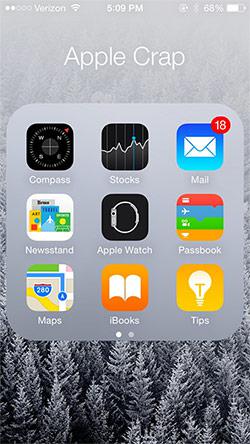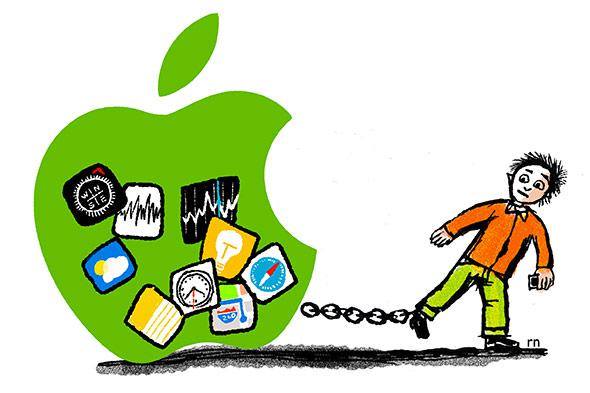I have a folder on my iPhone called “Apple Crap.” The name is a little unfair. The apps that come pre-installed on iPhones aren’t all crap. I even use a bunch of them. But you can’t fit a lot of nuance into the folder names on an iPhone. And it turns out a lot of other people, faced with apps they don’t want and can’t erase, have had the same idea.
Apple is well-known for carefully controlling its product ecosystem, so it’s not very surprising that the company makes most of its own apps undeletable. But consider the software that Apple permanently bonds to your devices, like Mail, Reminders, and iBooks. They say a lot about the company’s priorities, what it thinks its users want, and especially right now, what it wants its users to buy.
Take the newest software you can’t delete: the Apple Watch app. This sleek black square started popping up on iPhones a couple of weeks ago as part of the iOS 8.2 release. Apple Watch preorders don’t start until April 10, and the device won’t be in stores until April 24. Since every iPhone owner is also a potential Apple Watch owner, it’s obviously in the company’s interest to hype the product now. You can’t really use the app yet, so it’s effectively an ad. Or, as CNET puts it, it’s “the cold stare of capitalism urging [you] ever-closer to a multi-hundred dollar accessory purchase.”
Many of Apple’s other default apps, meanwhile, face stiff competition from third-party alternatives. Lists of which apps you should be using instead of the ones that came with your device pop up with regularity. But these workarounds “can’t change the shortcomings of your iPhone,” as Tech CheatSheet puts it. The default apps are still there, taking up space. If you really want to delete the Stocks or Tips apps, you’ll need to jailbreak your iPhone, a process most people don’t want to bother dealing with. (Apple didn’t respond to questions about why it makes only some apps deletable.)
Apple reinforces its own services by interconnecting them in ways that third-party developers can’t. For example, the undeletable Safari app is iOS’s default browser no matter how much you use an alternative like Opera or Chrome. And most third-party apps still can’t integrate Siri. “Fantastical is almost universally considered to be a superior calendar app to the one that Apple bundles with iOS,” David Price explains in Macworld UK. “But one disincentive to becoming a full-time Fantastical user is the lack of Siri integration. … It makes things exceptionally difficult for app developers to build market share.”

Screencap courtesy of Lily Hay Newman
The weirdest undeletable app has to be Stocks. There are lots of competitor stock apps out there, but more importantly it’s a pretty niche choice for a mandatory app. This is especially true because Apple offers plenty of apps you can delete. The company’s productivity suite (Numbers, Pages, Keynote), its mobile GarageBand app, and even Find My iPhone can all be eliminated with a press, a hold, and a wiggle. “But checking stocks? Oh wow, yeah, no. You have to do that! That’s … crucial, right?” writes Clive Thompson in an extensive meditation on the Stocks app.
Among the Apple faithful, undeletable apps seem to cause drama even more frequently than Steve Jobs biographies. For a while you not only couldn’t delete Newsstand, you also couldn’t even put it in a folder. And when Apple released the Tips app as part of iOS 8, users fiercely debated whether it was helpful or just a stupid waste of space. Most recently, the Apple news circuit blew up over a “secret” Apple app called Activity that’s hidden on every iPhone running iOS 8.2 but only shows up if you give in and buy an Apple Watch. The controversy centered around Apple’s decision to let the app lurk on every iPhone instead of offering it in the App Store for people to download once they bought their Apple Watches.
Impossible-to-remove apps—not to mention hidden ones—are especially irksome if you’re frequently butting up against the limits of your device’s capacity. Apple’s entry-level iPhones don’t have a lot of storage space. Every model starts at 16 gigabytes, except the candy-colored iPhone 5C, which only comes with 8GB. As the number of undeletable apps grows, so does the space burden on users with smaller-capacity iPhones. For the iPhone 5S, Apple offered three price points (with service contracts): $199 (16GB), $299 (32GB), and $399 (64GB). The iPhone 6 and 6 Plus have the same price points, but with 16GB, 64GB, and 128GB storage options. Each model moved up the capacity scale except the cheapest one. This decision suggests that Apple wants to push low-end users into relying on iCloud as a way of expanding their storage. Adding more mandatory apps and keeping old ones like Stocks around increase that pressure.
Apple has boasted that iPhones aren’t riddled with bloatware the way Android phones are. And it’s true that most Android devices are crowded with pre-installed apps from manufacturers and wireless carriers. But Apple’s own apps aren’t completely benign. “The difference between Android and iOS isn’t that Android comes with undeletable default apps and iOS doesn’t,” John Gruber wrote on Daring Fireball in 2010. “Lots of iPhone users wish they could get rid of apps like Stocks and Weather. The difference is who gets to decide on those default apps. With iOS, it’s Apple. … [With] Android phones, it’s the carriers.” Since Apple has always prided itself on building hardware and software together, its apps may be better integrated and of higher quality than the slapdash ones produced by carriers and other manufacturers, but they’re still pieces of software being imposed on users unconditionally.
Looking through my Apple Crap folder, I find several that strike me as apps I’d like to delete: Compass, Tips, Reminders, Voice Memos, and Newsstand. Will Apple’s empire really crumble if it’s not providing the go-to compass app?
Or is the better question to ask: Are we setting ourselves up for unforeseen consequences when we allow companies like Apple to make choices for us? Using an iPhone means accepting the company’s limitations and judgments—even if those judgments prove to be tone-deaf. “When you look at what you can and cannot delete on a new iPhone, you realize Apple has an incredibly weird and depressing view of what the lives of its users are like —and what we intend to do with our phone[s],” Thompson writes.
Then again, Apple developers may not realize what they’re imposing on us: They probably just can’t imagine not being able to afford Apple Watches and stock portfolios.
